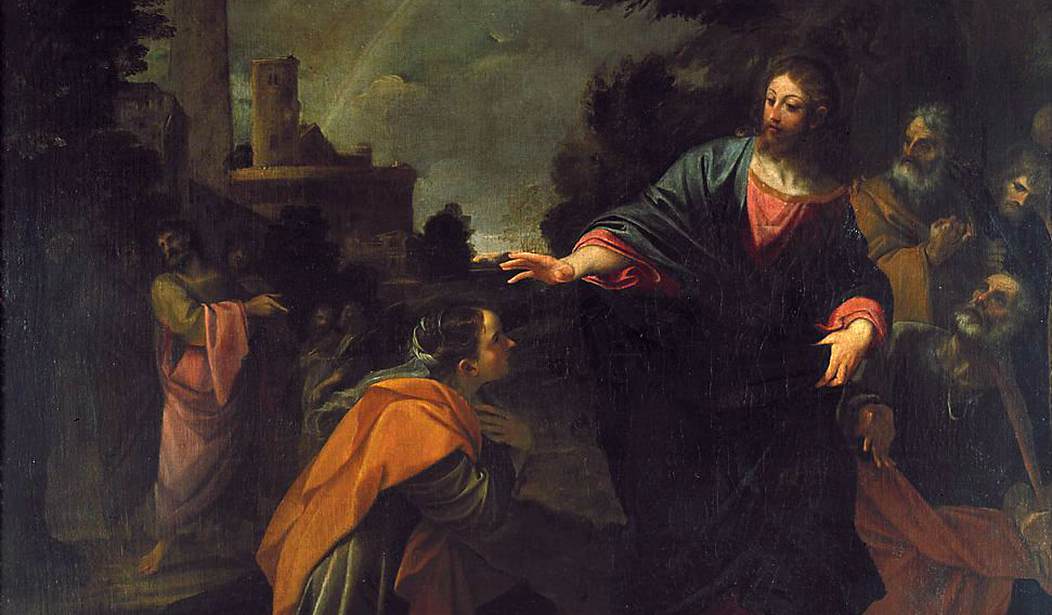This morning’s Gospel reading is Matthew 15:21–28:
At that time, Jesus withdrew to the region of Tyre and Sidon. And behold, a Canaanite woman of that district came and called out, “Have pity on me, Lord, Son of David! My daughter is tormented by a demon.” But Jesus did not say a word in answer to her. Jesus’ disciples came and asked him, “Send her away, for she keeps calling out after us.” He said in reply, “I was sent only to the lost sheep of the house of Israel.”
But the woman came and did Jesus homage, saying, “Lord, help me.” He said in reply, “It is not right to take the food of the children and throw it to the dogs.” She said, “Please, Lord, for even the dogs eat the scraps that fall from the table of their masters.” Then Jesus said to her in reply, “O woman, great is your faith! Let it be done for you as you wish.” And the woman’s daughter was healed from that hour.
How do we love the Lord? And is that love intended to separate us from others in Creation, or to bind us together as brothers and sisters in Christ?
In his mission, Jesus preached constantly on the need for the latter. That what makes this passage seems harsh and out of character, at least initially, and it is not the only such passage from Jesus’ teachings to use such stark terms. Earlier in Matthew 7 in the Sermon on the Mount, Jesus says, “Do not give dogs what is sacred; do not cast your pearls before swine.” That would seem to indicate a call to insularity, not for evangelization.
Clearly, though, Jesus has another purpose here. We know now that Jesus came to fulfill the original mission of the Israelites to establish a kingdom that would convert the world to the Word of God. In our first reading today, Isaiah calls back to that mission and reminds the Israelites that ‘foreigners’ have as much call to His love as long as they accept His Word:
The foreigners who join themselves to the LORD, ministering to him, loving the name of the LORD, and becoming his servants— all who keep the sabbath free from profanation and hold to my covenant, them I will bring to my holy mountain and make joyful in my house of prayer; their burnt offerings and sacrifices will be acceptable on my altar, for my house shall be called a house of prayer for all peoples.
If the Lord calls foreigners to join Him in a house of prayer for all peoples, why does Jesus at first put off the Canaanite woman? One reason, as Jesus explained to the disciples on another occasion, His mission was to convert the Israelites back to the path of salvation by the founding of His church. The church would then take its mission to the Gentiles, essentially reversing the model. Instead of Jerusalem being a city of priests and prophets to which the nations would come for conversion, the church would become the new Jerusalem and go to the nations of the Earth for conversion. This was Jesus’ final command in the Great Commission as He ascended to Heaven, and we remain on that mission to this day.
That formation occupied all of the efforts of Jesus and His disciples, but occasionally those travels put Him in contact with others. Other such encounters include the Samaritan woman at the well, the Roman soldier with the sick servant, and others. We know of these specific encounters because of their extraordinary outcomes; we can assume that many such people crossed paths with Jesus out of curiosity or circumstance, but not on account of real faith or belief.
The Canaanite woman, however, calls Jesus “Lord,” and has sincere belief in His authority. Jesus tests her by first ignoring her, and then testing her by reminding the woman of her incompatible standing with the Judeans. We have no scriptural description of other such encounters, but it seems likely that Jesus probably employed similar tests on others, who either lost interest or attempted to rebuke Him for such comments.
But how does the Canaanite answer? She does not take offense or assert her own standing; instead, she answers Jesus on His terms and humbly appeals to His authority. She demonstrates true faith and humility, and expresses her submission to Jesus. The Roman centurion does the same, acknowledging that his status makes him unworthy to have Jesus enter under his roof — words we repeat in every Mass to this day. And in both cases, Jesus heals their sick without even coming into their presence.
The Gospels record these passages as forerunners of the Great Commission, and perhaps especially of the mission of Paul as Apostle to the Gentiles. Jesus used these healings to contrast His reception by these Gentiles to that which He received from the Judeans, to whom He directly ministered, both as a rebuke to the latter and to signal the way in which we all need to approach His salvation.
We hear the same from Paul in his letter to the Romans, our second reading today. Paul writes that his mission is conversion of the Gentiles, in which he hopes that their example will serve as a way to call Paul’s own people to Christ:
I am speaking to you Gentiles. Inasmuch as I am the apostle to the Gentiles, I glory in my ministry in order to make my race jealous and thus save some of them. For if their rejection is the reconciliation of the world, what will their acceptance be but life from the dead?
The Canaanite woman, as well as the Roman centurion, is meant to make us “jealous” in a similar way. How often do we look askance at our brothers and sisters who claim salvation without “earning” it, so to speak? Do we resent the Lord’s grace in others while considering ourselves more worthy of it? Do we erect boundaries and barricades to those we consider “dogs” and “swine” rather than come to Christ in their abject humility for salvation?
If we put as much faith into Jesus as those who had no reason to believe did in those days, we will also find His Spirit entering us in the spirit of salvation.
The front-page image is “Christ and the Canaanite Woman” by Ludovico Carracci, c 16th century. On display at the Pinacoteca di Brera. Via Wikimedia Commons.
“Sunday Reflection” is a regular feature, looking at the specific readings used in today’s Mass in Catholic parishes around the world. The reflection represents only my own point of view, intended to help prepare myself for the Lord’s day and perhaps spark a meaningful discussion. Previous Sunday Reflections from the main page can be found here.







Join the conversation as a VIP Member